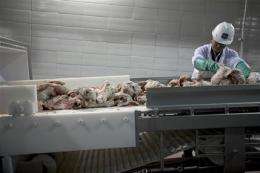Quick response averts market scare in mad cow case

(AP) -- The announcement that mad cow disease was spotted in a California cow drew a rapid response this week from the beleaguered American beef industry, which has been enduring one crisis after another for more than a year.
First, a severe drought in the Southwest cut cattle herd numbers to their lowest level in more than 60 years. Then an intense controversy erupted over a common type of filler known as "pink slime," hurting ground beef sales. The industry was just regaining its footing when the word of the mad cow discovery came Tuesday.
"They say things happen in threes, so hopefully this is the last one," said Buck Wehrbein, who manages a feeding operation in Mead, Neb.
The infected dairy cow, only the fourth ever discovered in the United States, was found as part of an Agriculture Department program that tests about 40,000 cows a year for the fatal brain disease. The animal apparently acquired the infection from a random mutation, not from eating infected cattle feed.
It was the first new case of mad cow disease in the U.S. since 2006 and came just as beef exports were finally recovering from an outbreak in 2003. With billions of dollars at risk, the USDA and other government officials responded quickly, explaining that consumers were never at risk because none of the animal's meat was bound for the food supply.
"It looks like that system is working, and for those of us in the business, that's a relief," Wehrbein said.
Mad cow disease, or bovine spongiform encephalopathy (BSE), is fatal to cows and can cause a fatal human brain disease in people who eat tainted beef. The World Health Organization has said that tests show that humans cannot be infected by drinking milk from infected animals.
The swift response also reflected a desire to avoid a repeat of the pink slime scare, which erupted when consumers learned some ground meat contained scraps of beef treated with ammonium hydroxide.
Some people and institutions responded by rejecting the product known as "lean, finely textured beef." And by the time the industry responded, demand had fallen dramatically and production plants had closed.
"In retrospect, they didn't take that seriously and I think they underestimated the impact the media could have on consumer behavior," said Heather Jones, an industry analyst with BB&T Capital Markets. "I think they wanted to be all over this to quell any concerns domestically, and also you don't want to lose any of your export markets."
After an outbreak of mad cow disease in 2003, beef exports plunged from $3.6 billion that year to $809 million in 2004. On Tuesday, meat industry groups, food companies and the American Veterinary Medical Association quickly issued statements and updated their websites, seeking to reassure the public that the nation's meat supply is safe.
"Consumers should be reminded that the BSE agent is not contained in beef muscle such as cuts like steaks, roasts and hamburger," Tyson Foods, the second-largest beef producer in the U.S., said in a statement.
The industry's challenges come as beef exports are soaring, hitting a record $5.4 billion last year. The trend is continuing this year, with export value up about 10 to 12 percent, said Joe Schuele, a spokesman for the U.S. Meat Export Federation, a trade group.
Leading beef importers, including Canada, Mexico and Japan, responded quickly that the mad cow case would have no effect on their imports. But the strongest reaction among trade partners came from those who are already skeptical about the safety of U.S. beef.
In Taiwan, the legislature postponed indefinitely a planned discussion on American beef. Under pressure from Washington, recently re-elected President Ma Ying-jeou has been seeking to break a logjam on the long-running dispute.
Ma, however, is caught between growing popular opposition to U.S. beef and a parallel desire not to endanger the resumption of stalled trade talks, which are seen as crucial to keeping up the island's competitive edge in global trade.
The Chinese government did not immediately respond to a request for comment, but a consultant said the BSE discovery is likely to push the government toward establishing strict criteria on American beef. But that's only if China resumes importing the beef at all.
China imposed a ban on American beef after the 2003 outbreak. Talks on the issue resumed in 2010, with the latest round occurring in February 2011.
Demand for beef in China has increased from 5.6 million tons in 2005 to 6.5 million tons last year, according to consulting firm Frost & Sullivan. In recent years, the Chinese have eaten more beef than the nation can produce, and 10,000 to 60,000 tons of beef have been imported primarily from Australia, Uruguay and Brazil.
In South Korea, the second- and third-largest grocery retailers pulled U.S. beef from their stores to calm worries among consumers. But one of them resumed sales within hours, citing a government announcement of increased inspections.
South Korea is the fourth-largest importer of American beef. It bought $563 million worth last year.
Live cattle futures markets plummeted Tuesday, even before the Agriculture Department's announcement of the mad cow discovery, but they recovered Wednesday as it became clearer that exports would not take a significant hit.
"The only two things that move the market are fear and greed, and fear moved it yesterday, but it's coming back," said cattle rancher Bill Donald, of Melville, Mont.
The quick response from the industry and the government helped, he said.
"The main thing with consumers is just to reassure them of the safety of our product and all the different firewalls we have in place," he said.
©2012 The Associated Press. All rights reserved. This material may not be published, broadcast, rewritten or redistributed.















